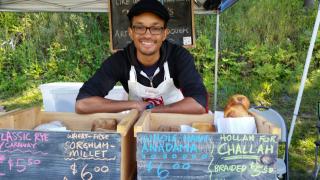A Story Inherited

Jabari Jones selling his bread.
Yesterday, a new employee—a white guy—walked into the bakery where I work. “Hi,” he said. “I don’t think I’ve met you yet.” He told me his name.
“I’m Jabari,” I replied.
“Are you American?,” he asked.
I hesitated. “Yeaaaaaaaaaah.”
“Well, it’s just that your name is very esoteric! Well, it was nice to meet you.” And he left.
I’ve been called lots of things because of my name, but never “esoteric.” It’s awkward and frustrating to be othered in this way. I keep telling myself that it has nothing to do with me. Maybe he’s actually really nice but socially inept, like the cafe manager says. Or maybe he’s on the autism spectrum, and can’t help but not have a filter. Or maybe it’s just another day of being Black in America with a “Black-sounding” name.
“Jabari” comes from Swahili and Arabic, and means fearless or brave; also bringer of comfort or consoler. I am a spiritual warrior. This is my path, so it’s important for me to plunge deep into my discomfort, breathing into it. What is this pain, this anger, and what is at the heart of it? An insecurity; a sense that I do not belong here. I attribute this insecurity partly to centuries of white supremacy in established U.S. law, institutions and society: The 1790 Naturalization law. Plessy versus Ferguson. The hell-on-earth conditions of the slave ships, auctions, plantations. Jim Crow. And so on. All of which my ancestors survived, resulting in my being alive right now. But the message from dominant culture was clear: you are not American, you are not meant to survive.
“Not belonging here” is a story I have inherited, an American inheritance. I was born and raised here, yet to some I am and always will be from “somewhere else.” I am a free person born into an unfree place. When I feel that unfreedom imposed on me, it gets under my skin, like a violent force of forgetfulness.
| Date added | |
|---|---|
| Tagged as |